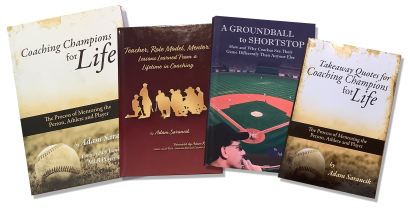|
Even if the last game of the season ends in a victory, the off-season begins for me after the last out of that game. Next season, I know I must be better and my team must be better. I begin to immediately analyze the ways we met and did not meet our goals for our team becoming better people, athletes, and players. Here are the things I think all coaches should do during the off-season to maximize their chances of having the best possible outcome for the next season. You will note that everything I advise my players to do, I require first from myself.
Adam Sarancik is the Author of Four Amazon Top 100 Best Selling Baseball Coaching Books:
|







